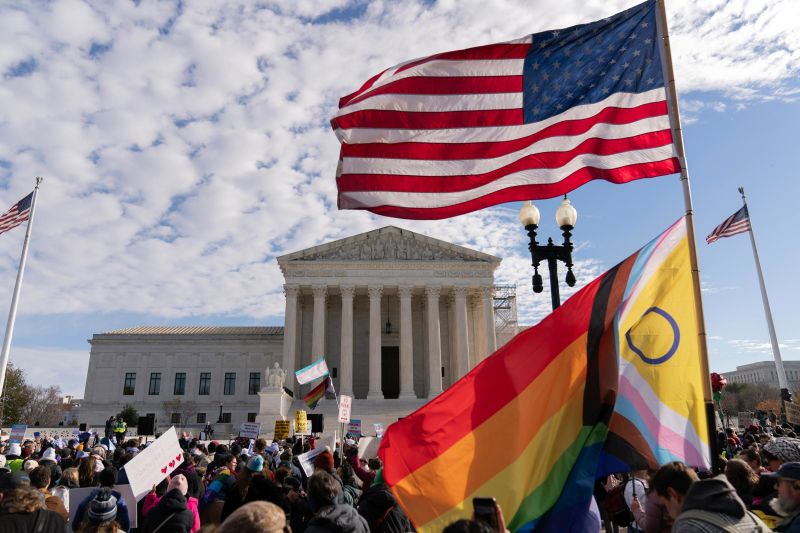The Supreme Court appeared likely to back a divisive Tennessee law that bans gender-affirming care for minors after more than two hours of oral arguments on Wednesday in which the court delved into a culture war battle that has become even more politically fraught since the election.
Several conservative justices – notably Chief Justice John Roberts and Justice Brett Kavanaugh – signaled deep reservations with the idea of courts second-guessing lawmakers who have approved bans on puberty blockers and hormone therapy for minors in roughly half of the nation’s states.
The court’s three liberal justices appeared to be aligned in favor of the trans youth and their parents who challenged the Tennessee law and the Biden administration in saying that transgender Americans should receive heightened protection under the law. And one key conservative – Justice Neil Gorsuch – was notably silent.
The transgender care case is the most significant matter to come before the Supreme Court this term – and it has become even more extraordinary since former President Donald Trump was elected to a second term, in part on a campaign to end the “transgender craziness.”
More than 110,000 teenagers live in states where restrictions on transgender care exist, according to the Williams Institute at UCLA School of Law.
Here’s what to know from Wednesday’s historic arguments:
Roberts, Kavanaugh wary of courts second-guessing legislatures
On multiple occasions, Roberts and Kavanaugh, two of the court’s most important votes, suggested that the issue of gender-affirming medical treatments for minors should be left to legislatures to decide and that the courts shouldn’t play a role.
Roberts’ skepticism toward courts getting involved was a particularly worrying sign for the challengers to the Tennessee ban, as Roberts had previously sided with federal transgender employees in a major 2020 case finding those employees are covered under the workplace discrimination protections of the Civil Rights Act.
But on Wednesday, Roberts zeroed in on the “medical nuances” involved in deciding what treatments minors should have access to and he described this case as different from other legal disputes over sex-based policies because it is “intensely affected by medical considerations.”
“If that’s true, doesn’t that make a stronger case for us to leave those determinations to the legislative bodies, rather than try to determine them for ourselves?” Roberts said.
Kavanaugh, meanwhile, repeatedly described the dispute as asking the court to weigh the risks for one group of individuals – minors who would suffer if Tennessee law’s was upheld because they benefit from the treatments – against the risks for other individuals who would be harmed it was struck down and they received treatments that they later regretted.
Kavanaugh, like Roberts, said policymakers were better than courts at weighing those two issues, and noted that different states could come to different conclusions.
Alito and other conservatives focus on ‘detransitioners’
Several of the court’s conservatives appeared heavily focused on so-called detransitioners – individuals who regret receiving gender-affirming treatments earlier in their lives – as they expressed skepticism toward arguments that transgender Americans should receive heightened protection under the law.
Justice Samuel Alito, in particular, was interested in the question of whether transgender status is “immutable.” Historically, the court has considered immutability to be a key aspect of the characteristics of a group deserving of more protection.
“I think that the record shows that the discordance between a person’s birth sex and gender identity has a strong biological basis and would satisfy an immutability test,” Chase Strangio, a lawyer representing trans youth challenging the law, said in response.
For his part, Kavanaugh appeared interested in arguments pushed by detransitioners in friend-of-the-court briefs that states should take a more cautious approach to allowing minors to access gender-affirming care.
“You say there are benefits from allowing these treatments, but there are also harms, right, from allowing these treatments. At least the state says so – including lost fertility, the physical and psychological effects on those who later change their mind and want to detransition, which I don’t think we can ignore,” he said.
“How do we, as a court, choose which set of risks is more serious in deciding whether to constitutionalize this whole area,” Kavanaugh asked US Solicitor General Elizabeth Prelogar, who in response acknowledged that there “may be a small number that will regret this care.”
Conservative lawmakers’ defense of gender-affirming care bans often cite detransitioning as evidence of possible harm if patients come to regret their medical transition. But LGBTQ advocates argue that detransition is rare and is not always rooted in regret. A person may choose to stop undergoing treatment because they lack family support or access to adequate care, among other reasons.
Several studies have shown that most people who opt for gender-affirming care don’t later regret their choices — including an October 2022 study in the Netherlands that found 98% of transgender youth who had started gender-affirming medical treatment in adolescence continued to use those hormones around five or six years later in adulthood.
Kavanaugh worried about girls’ sports
Kavanaugh repeatedly raised concerns about the impact the court’s decision may have on girls’ sports – an issue that has already worked its way up to the Supreme Court in several cases.
“If you prevail here,” Kavanaugh pressed Prelogar, “what would that mean for women’s and girls’ sports in particular?”
It was notable that Kavanaugh was raising that question. The Trump nominee has discussed his efforts coaching basketball for his daughters’ teams, one of which even came to his confirmation hearing in 2018.
Would transgender athletes, Kavanaugh asked, “have a constitutional right” to play on girls sports teams, “notwithstanding the competitive fairness and safety issues that have been vocally raised by some female athletes?”
Prelogar countered that a win for the trans youth wouldn’t decide questions about sports. That’s partly because sex-separated spaces like bathrooms and sports teams already face a heightened level of scrutiny and so are analyzed differently.
If the majority wanted to “preserve space to make clear that nothing here should be understood to affect the separate questions” about sports teams and bathrooms, Prelogar said, “the court could very well do so.”
The Supreme Court is already weighing two appeals – one from Idaho and the other from West Virginia – on that question.
Gorsuch, a key vote in transgender case, remains silent
One of the most notable twists in the hours of speaking was a conservative justice who decided to say nothing at all: Neil Gorsuch.
Gorsuch is considered a key vote in the case because he wrote the majority opinion in an unexpected decision four years ago in Bostock v. Clayton County that protected transgender employees from discrimination in the workplace. He was cheered by surprised LGBTQ+ advocates on the left and roundly criticized by conservatives – including several of his colleagues on the bench.
His decision not to ask a single question was highly unusual in such a high-profile case. As the court turned to the portion of the argument where questions are asked based on seniority, Roberts repeatedly turned to Gorsuch when it was his turn. Those invitations were met with total silence.
Gorsuch has stressed that his reasoning in Bostock was limited to workplace protections. And his position in Bostock drew a flurry of written arguments from conservative groups seeking to draw a distinction between what the court ruled in that context and what it was being asked to do for gender-affirming care.
Prelogar clearly picked up on the significance: As she was delivering her closing remarks, she frequently looked directly at Gorsuch.
Parental rights and Trump add uncertainty
When the court agreed to hear the Biden administration’s challenge to the law, it left in limbo an appeal brought by transgender minors and their parents that asked the court to consider the rights of parents to make medical decisions for their children.
It’s an issue that has divided conservatives – and it may leave on the table future challenges to transgender care bans, even if Tennessee prevails.
Justice Amy Coney Barrett, a conservative, pressed advocates on both sides of the case about whether a ruling in the state’s favor would foreclose courts from considering any future challenge of the law based on those grounds.
“Even if we decided that this wasn’t a sex-based classification that triggered intermediate scrutiny, that would not prevent parents from still asserting the substantive due process, right?” Barrett asked Prelogar.
“Yes, yes, of course. I agree with that,” Prelogar replied, adding that she thought the sex-based discrimination claim “is the most straightforward way to think about what’s going on here.”
Later, Barrett posed a similar question to Tennessee’s attorney, J. Matthew Rice, asking whether plaintiffs would be able to “continue to press that point in other cases” regardless of how the court rules in the case at hand.
“We agree,” Rice replied, adding that he thought the appeals court was correct when it shot down the parental rights claim last year.
It’s one of several issues that adds uncertainty to the future of the litigation around transgender rights. Another is Trump. The incoming administration may reverse the federal government’s position in the case, a move that would give the court the opportunity to dismiss the dispute outright.
That, in turn, could lead the justices to agree to hear the case brought by the minors and their families if they wanted to resolve the issue at all this session.
Tennessee’s opponents fear more sweeping bans
While Tennessee’s ban is limited to just minors, Prelogar repeatedly stressed that if the Supreme Court accepted the state’s arguments, those defenses would apply to more sweeping laws.
In the final moments of the hearing, the solicitor general took a shot at Kavanaugh’s emphasis on how states can come to different conclusions when their policymakers are weighing the risks of treatments for minors against their benefits.
“I think it’s important to recognize that my friend’s arguments would equally apply to a nationwide ban if this were enacted by Congress,” Prelogar said. “And so, I think that the court should keep that in mind when thinking about the level of scrutiny here.”
Prelogar said earlier that under Tennessee’s theory of the law, nothing would stop the state from banning gender-affirming care for all transgender people, not just minors.
Transgender rights advocates have argued that that anti-transgender laws aimed at supposedly protecting children are just the start of a strategy that would ultimately go after all transgender people.
Transgender lawyer makes history in SCOTUS faceoff
As the conservative justices signaled support for the Tennessee law, they were forced to do so before the first openly transgender attorney to argue a case at the Supreme Court.
Strangio, a seasoned ACLU attorney representing the Tennessee families challenging the ban, made history as he stood in the well of the ornate courtroom to field questions from the justices about why he believed the law is unconstitutional.
Though Strangio was only scheduled to present arguments for 15 minutes, he spent much longer at the lectern, going head-to-head with the conservatives about the law and a long history of anti-trans legislation in this country that he said underscored a need for the court to provide more legal protection for people like him.
The Tennessee law, he said, “has taken away the only treatment that relieved years of suffering for each of the adolescent plaintiffs.”
Cheers erupted outside the court when Strangio spoke to trans advocates following the hearing. Strangio thanked those who braved the frigid Washington, DC, weather to stand up for their rights and the rights of transgender people across the country.
“Whatever happens, we are the defiance,” Strangio said. “We are collectively a refutation of everything they say about us. And our fight for justice did not begin today, it will not end in June – whatever the courts decide.”

